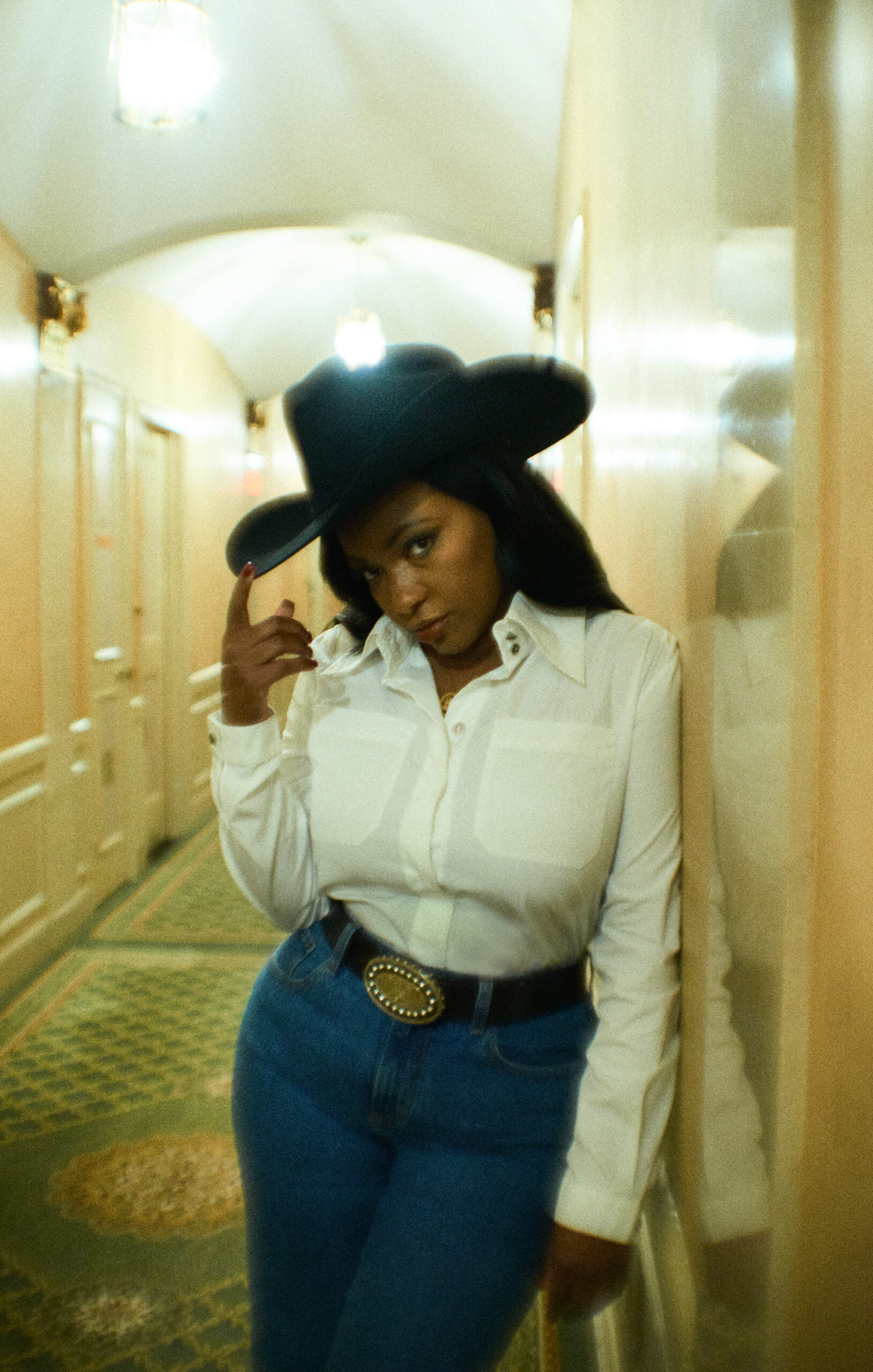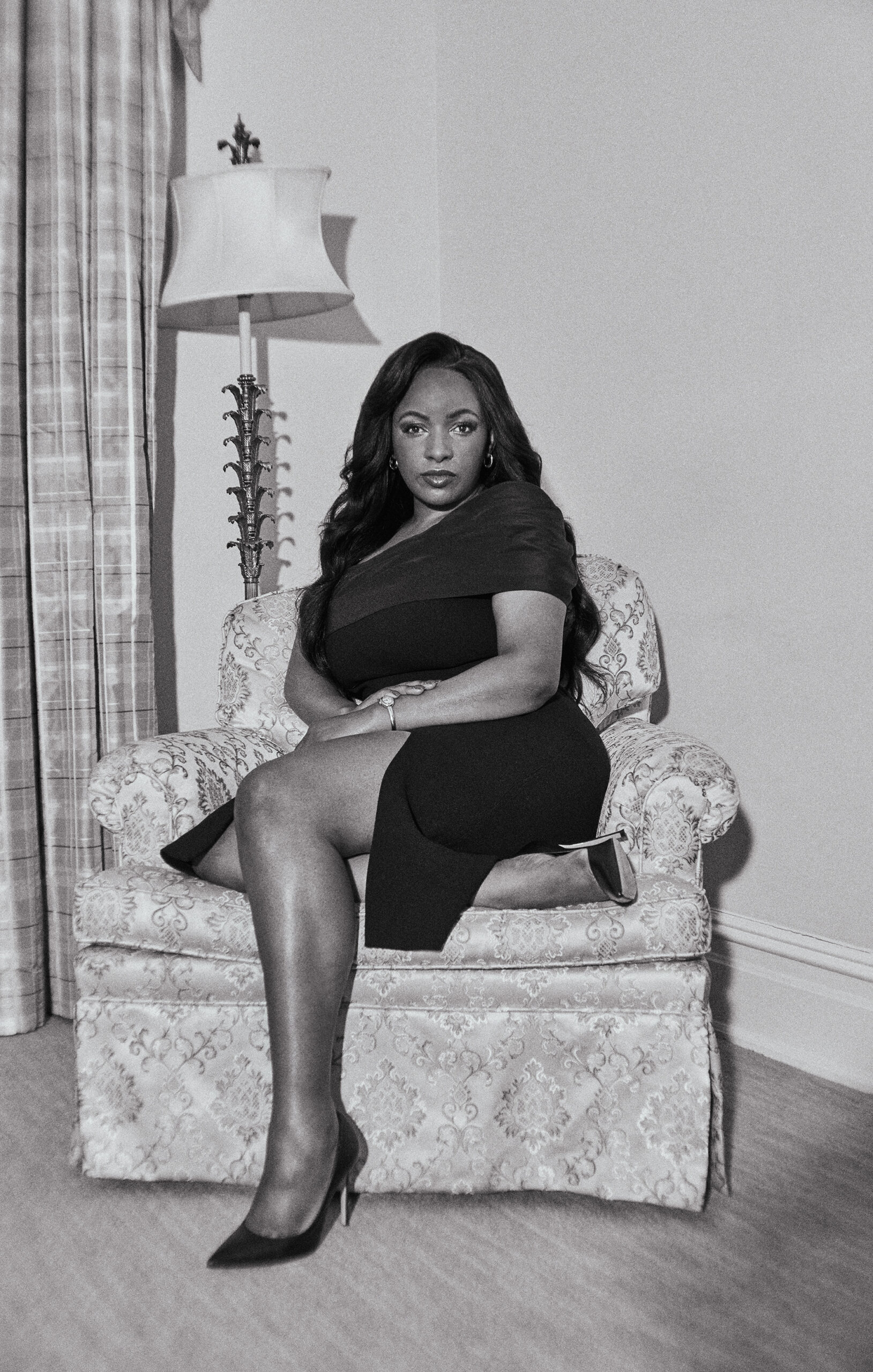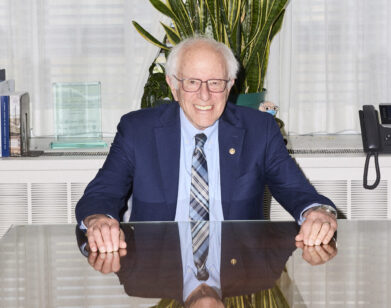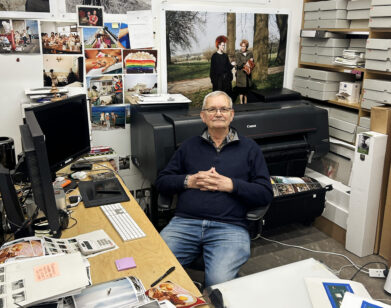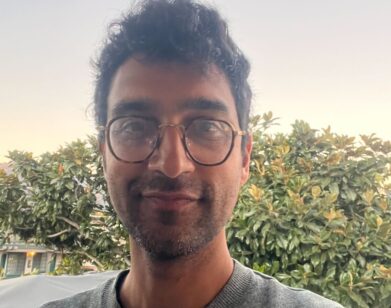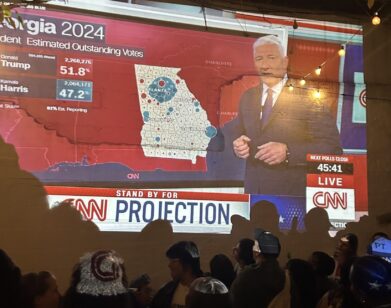POLITICS
“You Cannot Delete a People”: Rep. Jasmine Crockett, by Whoopi Goldberg
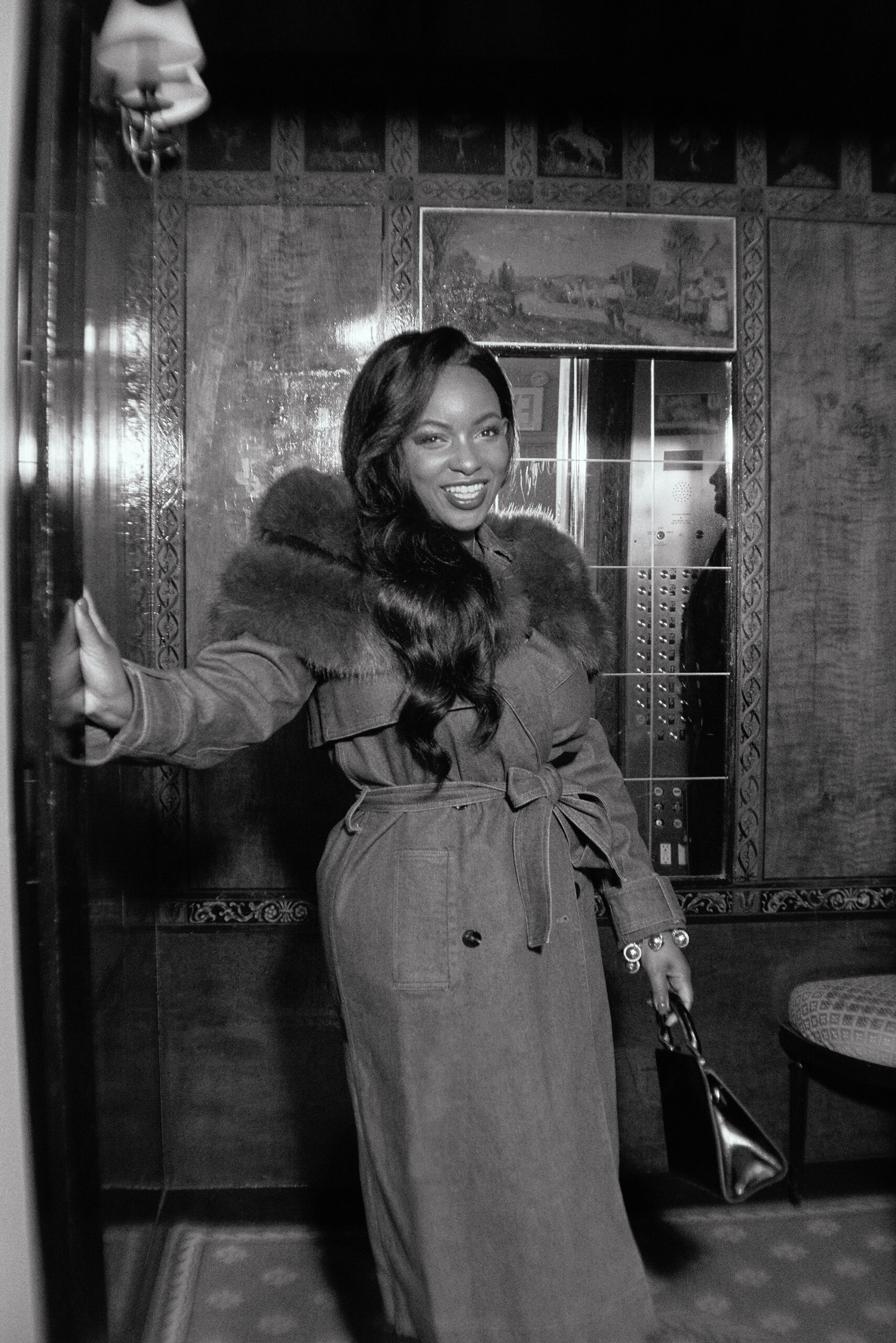
Representative Jasmine Crockett wears Coat and Stole Adrienne Landau. Bracelet Kentshire. Bag Brandon Blackwood.
“Bleach blonde, bad built, butch body.” Truer words have never been spoken. As a refresher: In May, during a tense House Oversight Committee meeting, Republican Congresswoman Marjorie Taylor Greene unleashed an unwarranted personal attack on the physical appearance of her colleague, freshman Democratic Congresswoman Jasmine Crockett. In a clapback that was tweeted around the world, Crockett stood up for herself, refusing to let Greene’s vile brand of maliciousness go unchecked. Crockett said those immortal words, and a new political star was born. As it turns out, the 43-year-old, Missouri-born Texas Democrat has been fighting the good fight for her entire career, starting out as a public defender and then taking on pro bono cases for Black Lives Matter activists in her private firm. Now that she’s captured the nation’s attention, her next battle is helping to elect Vice President Harris. She spoke with another figure who’s never been afraid to speak her mind, Whoopi Goldberg, about her goals as an elected official and her readiness if the Marjorie Taylor Greenes of the world come for her again.
———
TUESDAY 3 PM JUNE 11, 2024 WASHINGTON, DC
JASMINE CROCKETT: Hi, Whoopi! I’m eating pizza. It’s the first time I’m for real able to eat today. How are you?
WHOOPI GOLDBERG: I’m good, girl. Happy to be awake, upright, and all those other things. I’m going to Rome tomorrow to meet the pope.
CROCKETT: [Laughs] Not what I thought you were going to say.
GOLDBERG: He’s invited a whole bunch of comedians from around the world to come talk to him about humor.
CROCKETT: That is wild.
GOLDBERG: Alright, the first thing I want you to tell me is what you think your job is.
CROCKETT: As a member of Congress, or as an elected official as a whole?
GOLDBERG: Whichever floats you.
CROCKETT: At this moment, as a Black woman in politics with a platform, it’s to do my best to educate not just my community, but the country as a whole. It’s to make them feel closer to our government, because it was always supposed to be a government of the people, and people have become disenchanted with government because they don’t feel it’s like that. They feel as if they’re living in a space in which there are rulers who are trying to, depending on who you are, destroy your ability to live. I want people to be inspired by politicians because they have a heart for the people, because they absolutely want to be a part of what that representative government looks like. I also think that with all the difficulty that the Dems sometimes have in getting their word out with the pivotal election that we are facing, that my more immediate job is to translate for the presidential team their wins. It’s to make clear that this administration is empathetic and understanding of the struggles that people are still enduring, even though they say things like, “The economy is great.”
GOLDBERG: Right.
CROCKETT: It is, but that doesn’t mean that there isn’t room for improvement. That doesn’t mean that people aren’t suffering.
GOLDBERG: Do you think that if people celebrated civics, it would be a lot easier for us to recognize what each branch of government actually does? Because I know that most places not only don’t celebrate it, but they don’t teach it. Do you think that we are doing ourselves a disservice by not knowing how our own government works?
CROCKETT: Oh, absolutely. But that’s always in the playbook, especially in this country. The best way to hold a people down is to make sure they aren’t educated. I don’t want that to be interpreted as me calling anybody dumb, because the right tried to do that to me before. It’s not about the ability to learn, it’s about the lack of willingness to teach. We see that over and over, with the attacks on our education system as a whole, the things that are probably most valuable for us to learn, such as the topic of slavery. They don’t want us to learn, which obviously puts us at a disadvantage, because you’re doomed to repeat that type of history if there’s not an understanding of where we’ve been. Same thing with civics. There’s a lot that people don’t know about the basics of civics. When you start to get into the nitty-gritty of things that I do in my job, there are things that I didn’t know, and I was sitting as a lawmaker on the state level. So I try to “share the good news,” like when we started talking about foreign dollars, which has been a huge conversation recently—where people are concerned about money that is going elsewhere, and they’re like, “We need the money here.”
GOLDBERG: Right.
CROCKETT: I had an opportunity in Detroit this weekend to share the fact that we only spend 1 percent of our budget on our international endeavors. When you hear numbers that are way bigger than your bank account, you just hear big numbers, right? But contextualizing and making sure they understand, that’s another part of the civics education. I’m like, “Y’all don’t realize we have this super trillion-dollar budget. When we started talking about millions and billions, obviously it’s huge to us, but in the greater scheme of things—”
GOLDBERG: In the bigger picture.
CROCKETT: Yeah. I hate that we’ve pulled the civics out of school. It’s putting us in a disadvantaged situation, with people saying, “We’re not a democracy.” It is allowing for the breeding ground of our democracy to disappear in front of our eyes.
GOLDBERG: And people seem to be gleeful about that idea. I always think if you’re concerned about what your kid is doing in school, you should go talk to the teacher, talk to the librarian. If my mother didn’t want me to read something, she would go to the library and say, “Don’t give my kid this book.” People are spouting lots of ideas, but are they taking responsibility in places they could take responsibility?
CROCKETT: Whoopi, you grew up with Black parents, too. Life was definitely different growing up with my Black parents. I can remember my mom going to school because she was concerned and wanted more information. I went to a private Catholic school, and we learned about different religions, and my mom was like, “What are you learning?” I said, “We’re reading the Quran.” She needed to get a full understanding of that because I grew up in a very Christian home. I always had a mom that was engaged, and honestly, my teachers really did get the benefit of the doubt a lot of times. But she was making it about her child, not about everybody else’s child. Right now, there’s a trend in this country where everything is about control—controlling the narrative, rewriting history. It’s another way of spreading misinformation as far as I’m concerned. And it’s seeping through everything.
GOLDBERG: Right.
CROCKETT: When you decide that Black history is not a part of American history or when you decide that any book that talks about LGBTQIA relationships or LGBTQIA people, because you don’t understand them, should just be deleted, well, the reality is, you cannot delete a people. The country is becoming more and more colorful, and there are people who are afraid of the fact that they’re becoming the minority, and they want to maintain control. This is just another lever of control that they’re exhibiting.
GOLDBERG: It totally freaks me out. I don’t understand why you’re interested in what I’m doing with my body, or with my friends, or with my heart. It’s enough of a challenge to get through the world, now you have to worry about what somebody else is doing, and thinking, and feeling. Let me ask, what does the word “woke” mean to you?
CROCKETT: They have weaponized woke. They always want to co-opt Black culture. Wokeness is something that came through Black culture. It’s like, “Wake up.” To be woke means to be present, to be alert, and to be cognizant of what is happening, not to just be existing, but to actually be attentive. We can walk through the world, and we can get into routines, and get by on autopilot. It’s almost like sleepwalking. You’re just existing and ignoring the social issues that are happening around you. To be woke is to actually decide that you’re going to pay attention and hopefully be enlightened about what’s going on around you.
GOLDBERG: When I did Sister Act, we wrote a song that went, “You better wake up and pay attention if you want to go somewhere, you want to be somebody.”
CROCKETT: I know. I’m a Sister Act girl.
GOLDBERG: I love it. But it really was to say to young people, “Listen, you have some control here. And if you let this pass you by, who will you be then?” I’ve always tried to tell people that. “Whatever color you are, you need to wake up and know who you are and be proud of who you are, too. It’s not a Black thing. It’s a human thing.”
CROCKETT: It absolutely is.
GOLDBERG: Being woke means, “Wake up and be part of what’s going on in the world.” Now, I have to ask you about—you know. Have you had to deal with any more people messing with you and your groove and who you are? Did the message get through?
CROCKETT: I think the message has permeated, for sure. Actually, she [Marjorie Taylor Greene] skipped the first hearing that we had after that, and we’ve not had another hearing together. I only saw her for the first time on the floor, one day last week, and she literally walked right next to me. Baby, she ain’t even want to look at me, and she should probably keep it that way. Maybe at some point she might find the audacity to come for me again, but I don’t think it will be in the near future, because I do think that, while not knowing that the impact would be what it was, that the culture would just take off, and go after her the way that they did. I think she’s concerned because it’s sticking with her, and it’s obviously gotten to her as well, because she’s posting photos of her body. She posted one in a bikini, so I think that it really did get to her. I’m used to working in an environment similar to Congress where, number one, I’m in the minority. And number two, I know that there are people that believe that I got there because of affirmative action or something. I’m used to working in those types of environments. I’m also used to them saying what they got to say behind closed doors. I think there’s been a shift in this country where people have decided they don’t need to do it behind closed doors anymore.
GOLDBERG: Right. They can just say it out loud.
CROCKETT: They want to do it out loud and in your face. I don’t believe that you wake up one day and just decide that you’re going to be such a hateful person. The hate has already been there. It’s just a matter of where you shared your hateful spirit. I’m sure that there’s plenty of people that have lots of thoughts about me, but they still, for the most part, keep it to themselves.
GOLDBERG: I think it affected a lot of women, and not just Black women. A lot of women thought, “Okay, now you’re coming for another woman. Oh no, we are not going to do that.” Is there a way for us to roll back this kind of ridiculousness? Do we need to start sending people to etiquette classes? Because one of the things I admired about you was that your question was so elegantly done, and without malice. That was a lesson for a lot of people on how to handle somebody who’s coming for you, who you cannot just get up and get in their face, and say, “I’m sorry. Were you talking to me?” You didn’t do a De Niro on her, you know? How has that been for you? Have people seen that your demeanor really made her look as shabby as possible?
CROCKETT: I definitely thought through how to do this. Obviously, the first thought was to clap back immediately, which would not have been very good, or to get up out of my seat, which also would not have been good. So as we were trying to work through the process and do this the right way, it did provide an opportunity to reflect on, “What do you do in this moment?” I will say that you’re absolutely right. There are so many women that have come up to me and talked about their experiences at work, or who have felt like they were alone in some of those experiences. Not that they wanted me to go through it too, but to see that even at the highest levels, I could be dealing with those issues, it made them feel like, “Okay, so this isn’t just me.” And a lot of them have said that they appreciate just how poised I was in my response. When asked about it, I’ve told people, “Listen, it’s all about learning the rules of the game. Learn the rules and play the game better.” Unfortunately, that’s kind of what we’ve been taught as Black folk forever, anyway. It’s unfortunate because it’s like, “Why should I be treated any differently?” But what we saw and what we know is that I am treated differently, so in responding that way, I wanted to be clear about why it was so wrong. And in my mind, it’s an opportunity to open up different conversations with women. When I was in Detroit this weekend, there was an assistant minister who said, “You know what? I started wearing lashes just because of you.” All this solidarity has come about, whether it’s in the form of wearing lashes, or whether it’s women saying, “I’ve decided that I can stick up for myself.” So again, what she meant for evil, I really think that god meant for good.
GOLDBERG: And god really made it shine. I love it. One of the things I think is really sad is that people don’t know who the real beneficiaries of affirmative action are.
CROCKETT: It wasn’t Black folk.
GOLDBERG: White women benefited the most because they were oppressed in a different way, by just being women. We always have to find where we are in the pecking order, and we’re way out here. When you think about the history of the women’s movement—they’re fighting to become people in office and run companies—people got very, very upset. That began this craziness that we’re seeing today. It’s been a 50-year march towards removing women’s rights, women’s health issues, downplaying them, talking about abortion instead of women’s health issues. Using it as something to beat us with. I wonder if you could speak a little bit to what affirmative action actually means.
CROCKETT: I don’t think people ever really ask that question. They just listen to whatever radical rhetoric surrounds it. Affirmative action has never been about giving someone a leg up. It’s about making sure that you take a look at me. It’s about opening your eyes to the possibility of me. When people talked about the good old boys club, it was always about white men. You literally could have a more qualified woman that could do the job, but, “It’s a woman, so we’re not even going to look at you.” It’s interesting because my predecessor [Eddie Bernice Johnson], she’s the first of a lot of things. She was the first female head nurse for the Department of Veterans Affairs in Dallas. Her first name is Eddie and her second name is Bernice. When she showed up, they kept looking for the head nurse and couldn’t find her, because they were looking for a man. I can almost guarantee that she wouldn’t have gotten the job if her name weren’t Eddie, because they had never given the job to a woman. That’s what affirmative action is about. It’s about removing my sex from it, removing my color from it, looking at me for my qualifications and making a consideration. Ultimately it got turned into something else, where it’s like, “You’re going to get it just because of your color,” and that’s just not true.
GOLDBERG: My mom was a nurse, and when I was little she could only be a practical nurse because registered nurses were not Black. So I’ve always thought that affirmative action was like saying, “Listen, this is not the best way to run the United States. You have to consider me as well.” But I’m glad we could talk about this, because you are one of the clearest, smartest young women out there, and it’s important people recognize you in your gig. It’s your gig that is pushing you to these different heights.
CROCKETT: I was shocked when they said that you could do this, and I’m still in awe that you would make the time.
GOLDBERG: Oh my god. I can’t tell you how much you moved me, because there’s lots going on in the world, and yet you found a way to be gracious, and that to me is everything.
CROCKETT: I hope you have an amazing time meeting the pope. I don’t know how you’re going to pack for your trip.
GOLDBERG: It’s done. You know, I really believe in trying to find people who want to make stuff better, and I don’t have to agree with everything they say, but if you can agree on making things better, we can do anything. But I’m an old hippie, so I believe in moonbeams and shit. Peace out.
———
Hair: Ro Morgan using Balmain Hair & Dyson Beauty at The Wall Group.
Makeup: Kento Utsubo using MAC Cosmetics.
Nails: Leanne Woodley for She Nails It at See Management.
Photography Assistants: Jewel Campbell, Lana Dang and Kermide Luc.
Fashion Assistant: Nicholson Baird.
Makeup Assistant: Tommy Tafoya.
Production Assistant: Georgia Ford.
Location: The Sherry-Netherland.


